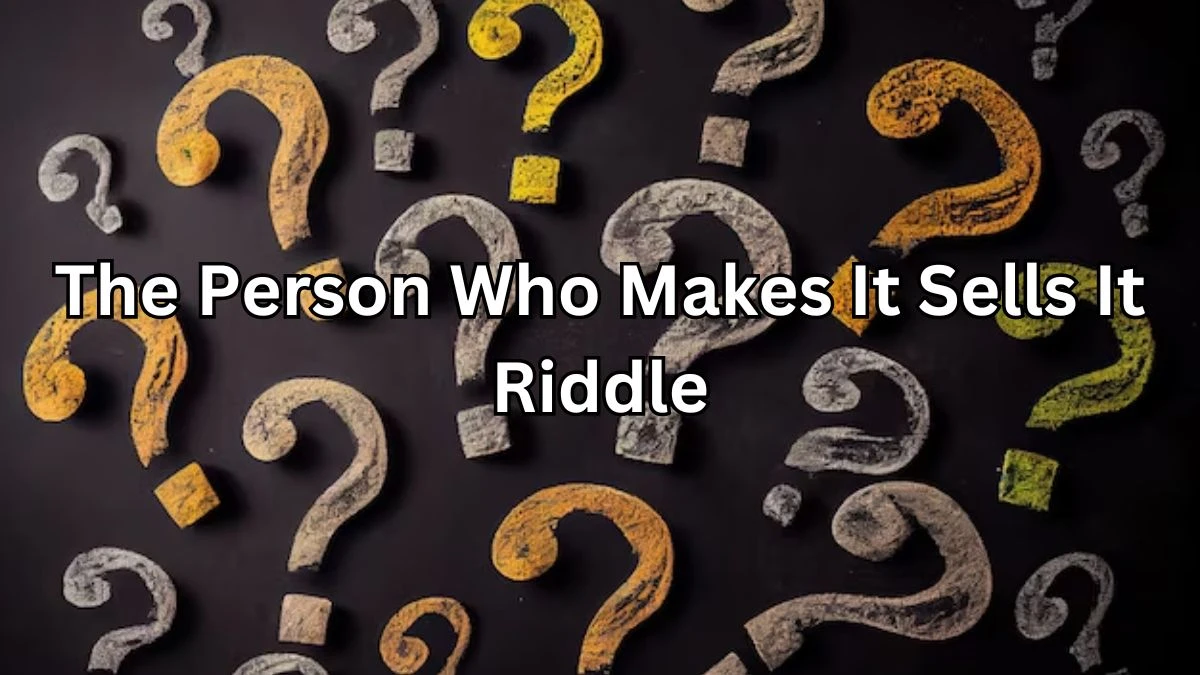- Rojgarlive »
- Riddle »
- The Person Who Makes It Sells It Riddle and Answer
The Person Who Makes It Sells It Riddle and Answer
by S Samayanka
Updated Feb 08, 2024

The Person Who Makes It Sells It Riddle
The riddle "The person who makes it sells it" poses a puzzling question about an item and its mysterious journey. In simple terms, it means that the thing being made is eventually sold by its creator. This implies a kind of object that undergoes production and then gets exchanged for money. However, the twist comes in the next part: "The person who buys it never uses it."
This suggests that whoever purchases this item doesn't actually use it for its intended purpose. Lastly, "The person who uses it doesn't know it" adds another layer of intrigue, indicating that the user might not even realize they're using it. This riddle challenges us to think creatively about the nature of the item in question and how it fits into various roles without giving away its identity outright.
Riddle: The person who makes it, sells it. The person who buys it never uses it. The person who uses it doesn't know it. What is it?
The Person Who Makes It Sells It Riddle Answer
The answer to the riddle "The person who makes it sells it" is a coffin. This seemingly simple answer holds a deeper meaning when analyzed. Coffins are crafted by individuals, often carpenters or workers in the funeral industry, and then sold to funeral homes or directly to families. The phrase "the person who buys it never uses it" refers to the fact that once someone purchases a coffin, they themselves won't be the ones using it; instead, it's used for the deceased.
Lastly, "the person who uses it doesn't know it" suggests that once a person is inside the coffin, they are deceased and therefore unaware of their surroundings. This riddle, with its morbid undertones, challenges us to think critically about the life cycle of objects and the roles they play in different contexts.
Answer: “A Coffin”
What is Riddle?
A riddle is a form of enigmatic expression that challenges the intellect and encourages creative thinking. It typically presents a puzzling question or problem, often in a metaphorical or allegorical manner, with the goal of teasing out a clever and unexpected answer.
Riddles have been an integral part of human cultures throughout history, serving as a source of entertainment, mental stimulation, and sometimes even educational tools. They exist in various forms, from verbal puzzles to written or visual conundrums. Riddles often require lateral thinking, as they demand individuals to approach problems from unconventional angles to arrive at a solution.
In essence, a riddle is a playful and imaginative exercise that invites individuals to engage their cognitive abilities, fostering a sense of curiosity and the joy of unraveling mysteries. Whether used for amusement, social interaction, or intellectual development, riddles endure as timeless expressions of human ingenuity and the universal desire for mental challenges.
Benefits of Solving Riddle
- Mental Exercise: Engaging with riddles provides a mental workout, enhancing cognitive abilities and boosting critical thinking and problem-solving skills.
- Language Development: Riddles, often filled with wordplay and clever language usage, contribute to the enrichment of vocabulary. Regular exposure improves linguistic creativity and proficiency.
- Cultivation of Creativity: The process of unraveling riddles encourages thinking outside conventional boundaries, fostering creativity and imaginative thinking.
- Entertainment and Social Interaction: Solving riddles is an enjoyable activity, offering entertainment and amusement. It can be a social experience, promoting interaction and friendly competition.
- Educational Insights: Riddles often convey cultural or historical insights, serving as a playful means to learn about language, traditions, and societal aspects. They can be incorporated into educational settings for engaging learning.
- Confidence Building: Successfully solving challenging riddles instills a sense of accomplishment, boosting self-confidence, and encouraging perseverance when faced with mental challenges.
- Memory Enhancement: Recalling information from riddles contributes to memory improvement. The mental effort involved in solving them strengthens memory retention.
- Logical Reasoning Development: Riddles typically follow a logical structure, guiding individuals through a sequence of thoughts or deductions. This aids in the development of logical reasoning skills.
The Person Who Makes It Sells It Riddle - FAQs
A riddle is an enigmatic expression challenging intellect with a clever, unexpected answer.
Coffins fit the criteria: made and sold by someone, bought but not used by the purchaser, and used by someone unaware (deceased).
Mental exercise, language development, creativity cultivation, entertainment, educational insights, confidence building, and logical reasoning development.
Critical thinking, problem-solving, vocabulary, creativity, memory retention, and logical reasoning.
They provide entertainment, encourage friendly competition, and promote shared experiences, fostering social interaction and bonding.




